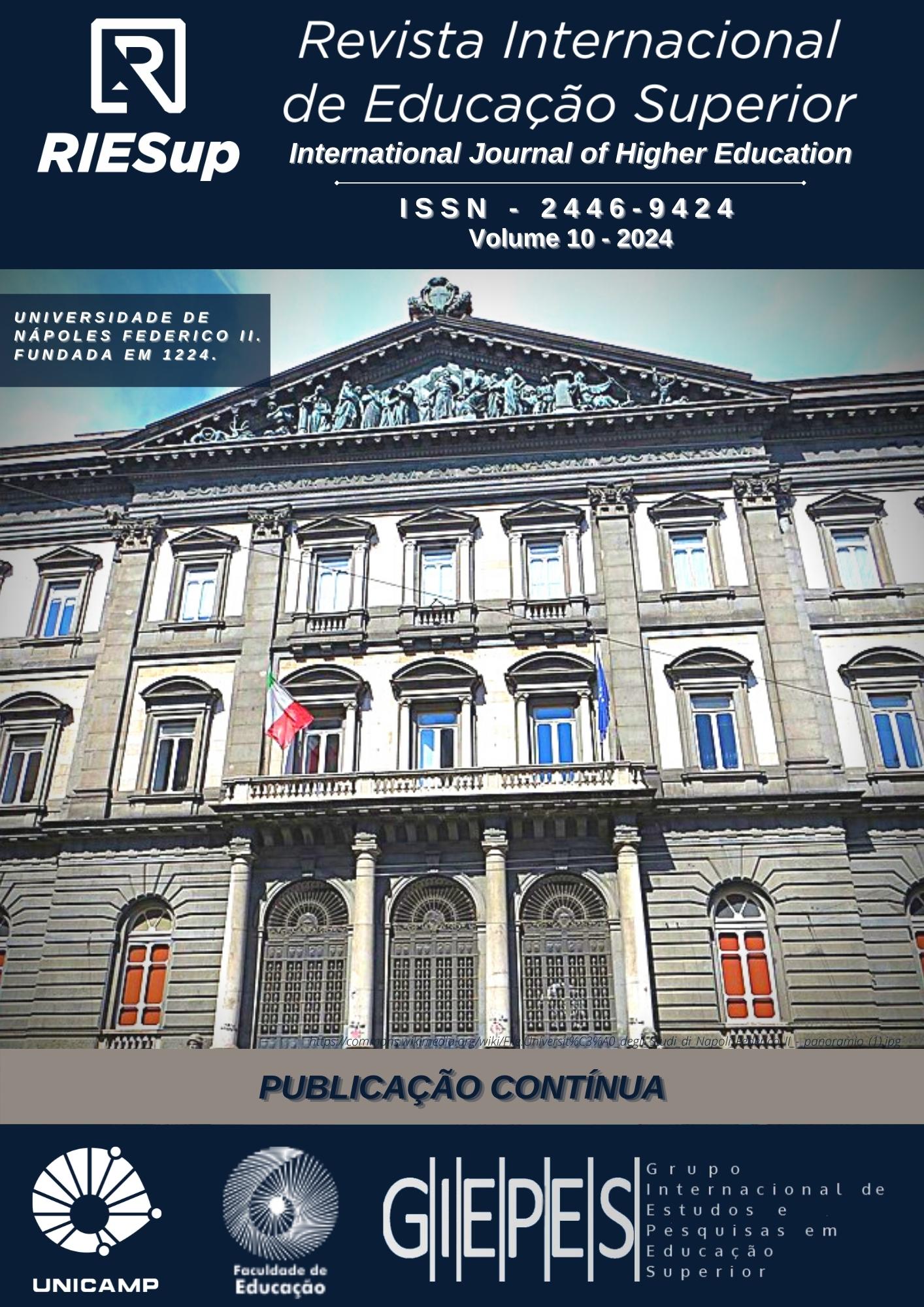Abstract
Introduction: In times of global intensification of the internationalization in higher education and its importance for educational institutions worldwide, this research addresses this complex theme, exposed to multiple interpretations and perceptions, through an investigation carried out over the convergences and divergences on students’ perceptions on the reality of Brazilian higher education institutions. Methodology: The research was conducted in four large Brazilian higher education institutions (HEIs) and its domestic and international undergraduate students. This analysis was carried out through the understanding and perception of the local students and international students. The analysis was executed using exploratory, descriptive, analytic, interpretive, and qualitative research. The strategy used for data consolidation and presentation was a comparative study between these two groups. Results: The findings were that there is a strong link between internationalization and globalization, as well as mobility, the presence of a foreign language in the activities of IES and partnerships. Although it is maturing, the multiple interpretations for the internationalization of higher education persists. There is an identification of a different perspectives on themes and realities in relation to Brazil and the United States. Foreign students give more importance on Brazil after living in the country. Conclusion: The research showed that Brazilians have the perception that Brazil is behind the global context in higher education, while for North Americans, Brazil is aligned, the most positive perception of North Americans stands out. There is no consensus on the common "end" for university internationalization. The research also demonstrated a perception of a glamourization regarding internationalization of HEIs.
References
ARAYA, J. M.; OREGIONI, M. S. Internacionalización de la universidad en el marco de la integración regional. 1 ed. Libro digital: RIESAL, 2015. ISBN 978-987-28063-9-2.
ARUM, S.; VAN DE WATER. J. The Need for a Definition of International Education ln U.S. Universities. Bridges to the Futures: Strategies for Internationalizing Higher Education. Association of International Education Administrators. Illinois, Chapter 12, p.191-203, August 1992.
BARTELL, M. Internationalization of universities: a university culture-based framework. Higher Education, Winnipeg, v.45, p.43-70, January 2003. Disponível em: http://www.jstor.org/stable/3447513. Acesso em: 07 mar. 2021.
BRASIL. Censo da Educação Superior. Disponível em: http://portal.inep.gov.br/web/guest/censo-da-educacao-superior. Acesso em: 8 jan. 2020.
BRYMAN, Alan. Quantity and quality in social research. 2. ed. London: Routledge, 2004. ISBN 0-415-07898-9.
COELHO, I. M. A universidade, o saber e o ensino em questão. In: VEIGA, Ilma P.A.; NAVES, Marisa L. P. (Orgs). Currículo e Avaliação na Educação Superior. Araraquara: Junqueira & Marin, 2005. ISBN 9788586305276.
DE WIT, H.; HUNTER, F. Trends, issues and challenges in internationalisation of higher education: where have we come from and where are we going? Routledge Handbook of International Education and Development, New York, p.340-358, 06 August 2015. Disponível em: https://www.routledgehandbooks.com/doi/10.4324/9781315797007.ch25. Acesso em: 07 mar. 2021.
FREITAS, M. E. de. A mobilidade como novo capital simbólico nas organizações ou sejamos nômades? Organização & Sociedade, Salvador, v.16 - n.49, p. 247-264 - Abril/Junho, 2009.Disponível em: https://www.scielo.br/j/osoc/a/PJ4BTFW8CWj5kVNVqSvjVrc/?lang=pt&format=pdf. Acesso em: 07 mar. 2021.
GRAY, David. Pesquisa no mundo real. 2. Ed. Porto Alegre: Penso, 2012. ISBN 9788563899286.
KALNIN, Gulherme. Avaliação do ensino superior: uma análise comparativa entre o sistema de avaliação brasileiro e um sistema internacional de acreditação. 347p. Dissertação (Mestrado em Administração). Universidade do Estado de Santa Catarina, Florianópolis, 2016. Disponível em: https://sistemabu.udesc.br/pergamumweb/vinculos/000023/0000236f.pdf. Acesso em: 07 mar. 2021.
KNIGHT, Jane. Internationalization remodeled: definition, approaches, and rationales. Journal of Studies in International Education, v. 8, n 1 p. 5-31,2004. Disponível em: http://www.theglobalclass.org/uploads/2/1/5/0/21504478/rationale.pdf. Acesso em: 07 mar. 2021.
KNIGHT, Jane. Student mobility and internationalization: trends and tribulations. Journal of Research in Comparative and International Education. v. 7, n.1, p.20-33 2012. Disponível em: https://journals.sagepub.com/doi/10.2304/rcie.2012.7.1.20. Acesso em: 07 mar. 2021.
KNIGHT, Jane. International universities: misunderstandings and emerging Models? Journal of Studies. In: International Education, v. 19, n. 2, 2015. Disponível em: https://www.researchgate.net/publication/276101103_International_Universities_Misunderstandings_and_Emerging_Models. Acesso em: 07 mar. 2021.
LAUS, Sonia; MOROSINI, Marilia Costa. Internacionalización de la educación superior en Brasil. In: DE WIT, H. et al. (Eds.). Higher education in latin america: the international dimension. 1. ed. Washington, DC: The World Bank, 2005. ISBN 0-8213-6209-7.
LEAL, Fernanda. Bases epistemológicas da concepção dominante de ‘Internacionalização da educação superior’ no Brasil. Tese (Doutorado em Administração). Florianópolis: Universidade do Estado de Santa Catarina, 2020.
LEAL, Fernanda; STALLIVIERI, Luciane; MORAES, M. Indicadores de internacionalização: o que os Rankings Acadêmicos medem?. Revista Internacional de Educação Superior, 2017. Campinas, v.4 p.52-73, set/dez, 2017. Disponível em: https://periodicos.sbu.unicamp.br/ojs/index.php/riesup/article/view/8650638. Acesso em: 07 mar. 2021.
OLIVEIRA, Adriana Leonidas. De; FREITAS, Maria Ester. Motivações para mobilidade acadêmica internacional: a visão de alunos e professores universitários. Educ. rev. vol.32 no.3 Belo Horizonte. 2016.Disponível em: https://www.scielo.br/j/edur/i/2016.v32n3/. Acesso em: 07 mar. 2021.
RODRIGUES, Nelson. À sombra das chuteiras imortais. São Paulo: Companhia das Letras, 1993. ISBN 85-7164-320-2.
STALLIVIERI, Luciane. Internacionalização e intercâmbio: dimensões e perspectivas. Curitiba: Appris, 2017. ISBN: 9788547304249.
TEIXEIRA, Anísio. O Ensino Superior no Brasil – análise e interpretação de sua evolução até 1969. Rio de Janeiro: Fundação Getúlio Vargas, 1969. ISBN : 9788571082861
YIN, Robert. Estudo de caso: planejamento e métodos. 3 ed. Porto Alegre: Bookman, 2005. ISBN: 8536304626.
YIN, Robert. Pesquisa qualitativa: do início ao fim. Porto Alegre: Penso, 2016. ISBN 9781606237014.

This work is licensed under a Creative Commons Attribution 4.0 International License.
Copyright (c) 2022 Renato Pereira Lima de Carvalho, Mario Cesar Barreto Moraes



